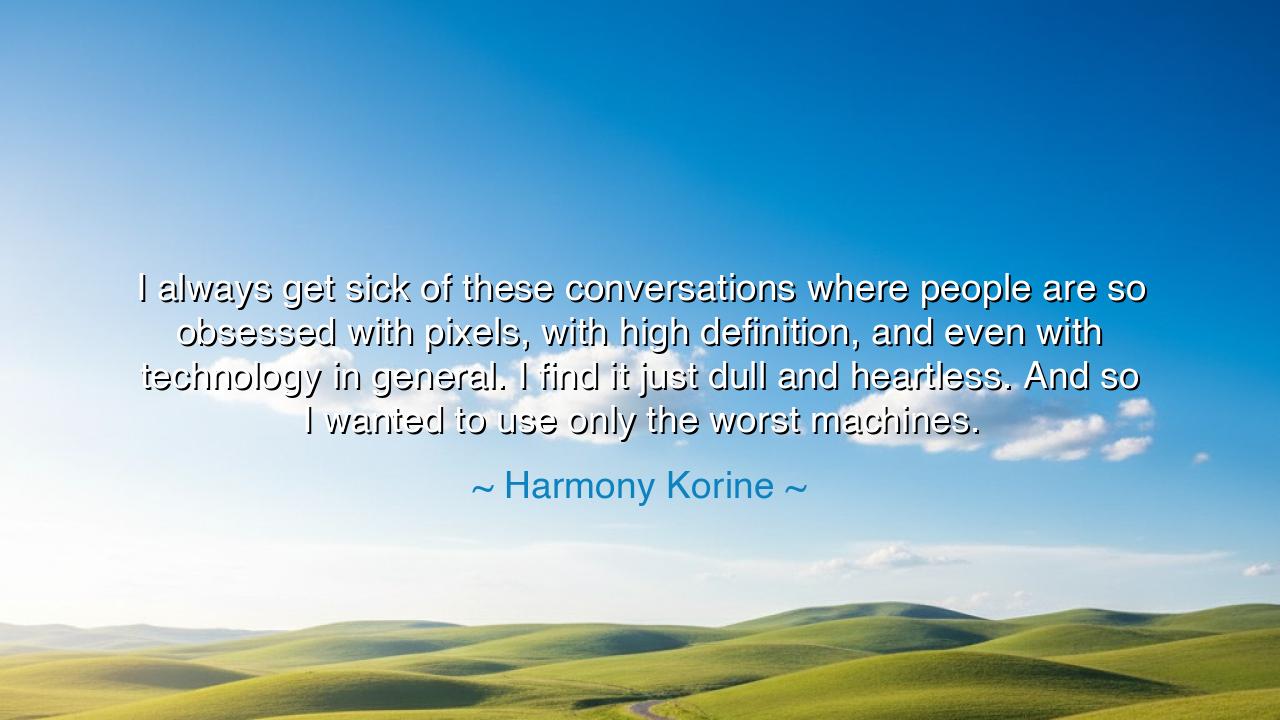
I always get sick of these conversations where people are so
I always get sick of these conversations where people are so obsessed with pixels, with high definition, and even with technology in general. I find it just dull and heartless. And so I wanted to use only the worst machines.






Hear, O seekers of art beyond the surface, the words of Harmony Korine, who dared to walk against the currents of his age. He declared: “I always get sick of these conversations where people are so obsessed with pixels, with high definition, and even with technology in general. I find it just dull and heartless. And so I wanted to use only the worst machines.” In this confession lies a rebellion, not against progress itself, but against the worship of polish over passion, surface over soul. It is a reminder that the essence of art is not in its tools, but in the fire that burns within the creator.
For Korine speaks of pixels and high definition, the idols of modern film and image-making. His lament is that men have mistaken clarity for meaning, mistaking perfect sharpness for truth. But truth, he declares, is not always neat, nor smooth, nor beautiful in its polish. Truth is jagged, raw, messy, alive. And so he chose the worst machines, not out of disdain for craft, but to strip away the veil of perfection, to let the roughness itself speak of reality. His art became a mirror of life, which rarely arrives in flawless frames.
Consider, O listener, the parable of Diogenes, the Cynic of ancient Greece. While others gloried in wealth, in polish, and in the trappings of status, Diogenes cast them aside, living in poverty and simplicity to reveal the truth of human folly. When Alexander the Great offered him any gift, he merely asked the king to step aside and stop blocking his sunlight. So too does Korine stand against the grandeur of modern perfection, reminding us that authenticity often hides in the rough, the unrefined, the broken.
History also bears witness in the realm of music. Think of the blues, born not of fine instruments, but of battered guitars and voices strained with sorrow. Their sound was imperfect by the measure of technology, yet within that imperfection burned a truth so powerful that it carried across generations. If one had demanded only perfect tone, the raw soul of the blues might have been silenced. Korine’s words echo this lineage: art lives in spirit, not in the sterile pursuit of technical flawlessness.
And yet, his statement is not merely artistic but philosophical. For the obsession with technology—be it in film, in life, or in commerce—can lead us into a kind of heartlessness, where we forget that tools are only servants. When we measure everything in pixels and data, we risk losing sight of humanity itself. The worst machines, then, become symbols of resistance, proof that meaning can flourish even when stripped of luxury, that beauty can be born in scarcity, that the human spirit is greater than its instruments.
The lesson for us is clear: let us not be deceived by perfection. Do not mistake the polish of the world for its truth. Seek the rawness, the unrefined, the broken places where life reveals itself most honestly. Use tools, yes, but do not worship them. Create with whatever you have—be it the best machine or the worst—and let the heart, not the hardware, be the measure of your work.
Therefore, O seeker, let Korine’s words be a challenge to you: break free from the tyranny of polish. Do not wait for the perfect tools before you begin your creation, your work, or your life. Use what is at hand, even if it is rough and imperfect, and let your spirit shine through the cracks. For the world does not need more flawless surfaces—it needs truth, raw and unashamed. And truth, as Korine teaches, can often be seen most clearly when the image itself is blurred.






AAdministratorAdministrator
Welcome, honored guests. Please leave a comment, we will respond soon